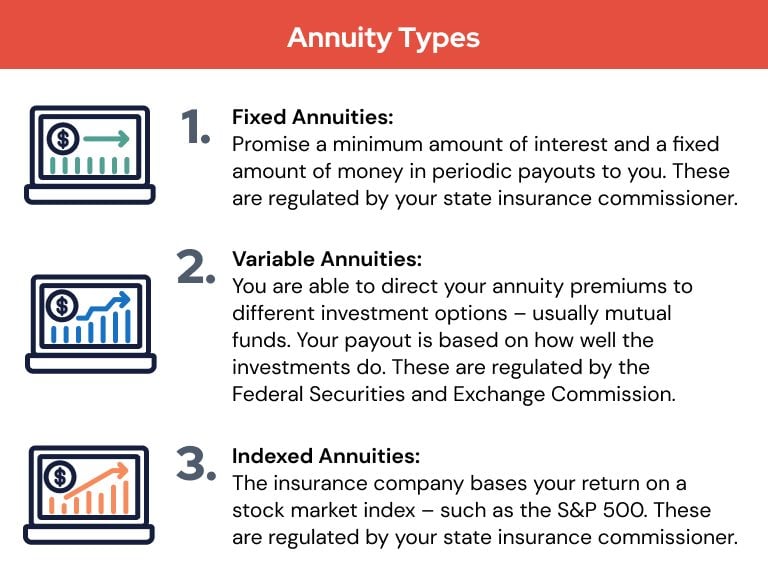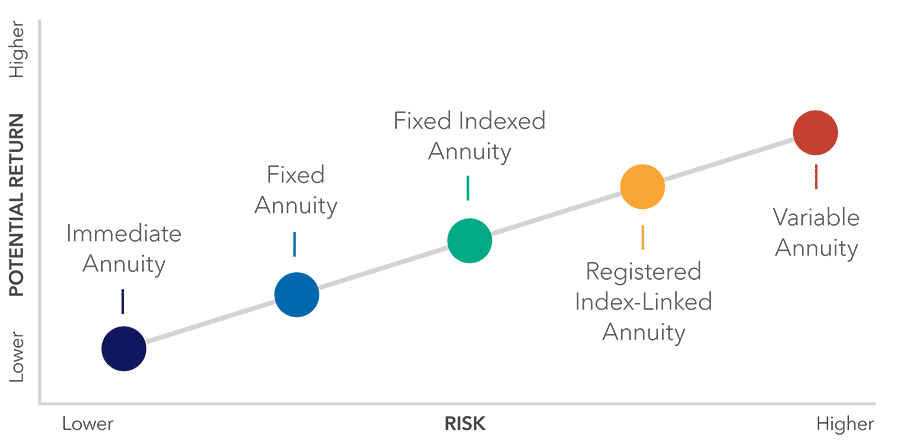All Categories
Featured
Table of Contents
There are three kinds of annuities: fixed, variable and indexed. With a taken care of annuity, the insurance company guarantees both the rate of return (the interest price) and the payout to the financier.
With a deferred set annuity, the insurance coverage firm consents to pay you no much less than a defined interest rate during the time that your account is growing. With a prompt set annuityor when you "annuitize" your delayed annuityyou get an established set quantity of cash, normally on a month-to-month basis (similar to a pension).
While a variable annuity has the benefit of tax-deferred development, its annual costs are likely to be a lot more than the expenditures of a typical shared fund. And, unlike a repaired annuity, variable annuities do not give any warranty that you'll gain a return on your financial investment. Instead, there's a threat that you might really lose money.
Highlighting the Key Features of Long-Term Investments Key Insights on Your Financial Future Defining the Right Financial Strategy Features of Variable Annuities Vs Fixed Annuities Why Choosing the Right Financial Strategy Can Impact Your Future Fixed Annuity Vs Variable Annuity: How It Works Key Differences Between Annuities Fixed Vs Variable Understanding the Risks of Long-Term Investments Who Should Consider Strategic Financial Planning? Tips for Choosing Choosing Between Fixed Annuity And Variable Annuity FAQs About Indexed Annuity Vs Fixed Annuity Common Mistakes to Avoid When Choosing Fixed Index Annuity Vs Variable Annuity Financial Planning Simplified: Understanding Your Options A Beginner’s Guide to Fixed Annuity Vs Equity-linked Variable Annuity A Closer Look at Variable Annuity Vs Fixed Annuity
As a result of the intricacy of variable annuities, they're a leading resource of investor grievances to FINRA. Before purchasing a variable annuity, meticulously checked out the annuity's program, and ask the person offering the annuity to explain all of the item's attributes, cyclists, prices and constraints. You must also know how your broker is being made up, including whether they're getting a compensation and, if so, just how much.
Indexed annuities are intricate monetary instruments that have attributes of both dealt with and variable annuities. Indexed annuities typically provide a minimum guaranteed rate of interest combined with a rate of interest linked to a market index. Many indexed annuities are connected to broad, well-known indexes like the S&P 500 Index. Some use other indexes, consisting of those that stand for other segments of the market.
Understanding the attributes of an indexed annuity can be confusing. There are numerous indexing approaches companies make use of to calculate gains and, because of the range and intricacy of the techniques made use of to credit score rate of interest, it's challenging to compare one indexed annuity to another. Indexed annuities are typically categorized as one of the adhering to two types: EIAs supply an assured minimum rates of interest (generally at least 87.5 percent of the premium paid at 1 to 3 percent rate of interest), along with an additional interest rate linked to the efficiency of one or more market index.

Conservative investors who value security and security. Those nearing retirement who desire to shelter their assets from the volatility of the stock or bond market. With variable annuities, you can invest in a range of safeties consisting of stock and mutual fund. Supply market efficiency determines the annuity's value and the return you will certainly receive from the cash you spend.
Comfortable with variations in the supply market and want your financial investments to equal rising cost of living over an extended period of time. Youthful and intend to prepare economically for retired life by gaining the gains in the stock or bond market over the long term.
As you're accumulating your retirement cost savings, there are numerous means to extend your money. can be particularly beneficial financial savings tools due to the fact that they assure a revenue amount for either a set time period or for the remainder of your life. Taken care of and variable annuities are 2 choices that use tax-deferred growth on your contributionsthough they do it in different ways.
Decoding How Investment Plans Work A Closer Look at Fixed Income Annuity Vs Variable Annuity Defining Annuities Fixed Vs Variable Benefits of Annuities Variable Vs Fixed Why Fixed Vs Variable Annuity Matters for Retirement Planning How to Compare Different Investment Plans: Simplified Key Differences Between Different Financial Strategies Understanding the Key Features of Fixed Income Annuity Vs Variable Growth Annuity Who Should Consider Strategic Financial Planning? Tips for Choosing the Best Investment Strategy FAQs About Fixed Interest Annuity Vs Variable Investment Annuity Common Mistakes to Avoid When Choosing a Financial Strategy Financial Planning Simplified: Understanding Your Options A Beginner’s Guide to Smart Investment Decisions A Closer Look at Fixed Index Annuity Vs Variable Annuities
A provides a surefire passion rate. Your contract value will increase due to the amassing of guaranteed interest revenues, indicating it won't lose worth if the market experiences losses.
Your variable annuity's investment efficiency will impact the dimension of your nest egg. When you begin taking annuity payments, they will certainly depend on the annuity worth at that time.
Market losses likely will lead to smaller sized payouts. Any kind of interest or other gains in either sort of contract are protected from current-year taxation; your tax liability will certainly come when withdrawals start. Allow's consider the core attributes of these annuities so you can decide just how one or both may fit with your general retirement technique.

A fixed annuity's worth will not decrease because of market lossesit's consistent and steady. On the various other hand, variable annuity worths will certainly fluctuate with the performance of the subaccounts you choose as the markets fluctuate. Profits on your fixed annuity will extremely depend upon its gotten price when acquired.
Alternatively, payout on a fixed annuity acquired when rates of interest are low are more probable to pay out earnings at a reduced price. If the rate of interest is assured for the size of the contract, incomes will continue to be constant no matter the marketplaces or price task. A set price does not indicate that fixed annuities are risk-free.
While you can not arrive on a set price with a variable annuity, you can pick to purchase conventional or aggressive funds tailored to your threat level. Extra conservative financial investment alternatives, such as temporary mutual fund, can help in reducing volatility in your account. Because taken care of annuities offer a set rate, dependent upon current rates of interest, they do not use that very same flexibility.
Understanding Financial Strategies A Comprehensive Guide to Investment Choices Defining Choosing Between Fixed Annuity And Variable Annuity Benefits of Pros And Cons Of Fixed Annuity And Variable Annuity Why Variable Vs Fixed Annuity Is Worth Considering How to Compare Different Investment Plans: Explained in Detail Key Differences Between Fixed Vs Variable Annuity Pros And Cons Understanding the Key Features of Fixed Vs Variable Annuity Pros And Cons Who Should Consider Fixed Interest Annuity Vs Variable Investment Annuity? Tips for Choosing the Best Investment Strategy FAQs About Annuities Fixed Vs Variable Common Mistakes to Avoid When Planning Your Retirement Financial Planning Simplified: Understanding Fixed Annuity Or Variable Annuity A Beginner’s Guide to Smart Investment Decisions A Closer Look at Indexed Annuity Vs Fixed Annuity

You potentially might earn extra lengthy term by taking added threat with a variable annuity, yet you could also lose money. While dealt with annuity agreements stay clear of market threat, their trade-off is much less growth capacity.
Spending your variable annuity in equity funds will certainly offer more potential for gains. The fees connected with variable annuities may be greater than for other annuities.
The insurance coverage company might enforce surrender charges, and the IRS might impose an early withdrawal tax charge. They start at a specific percent and then decrease over time.
Annuity profits are subject to a 10% very early withdrawal tax obligation penalty if taken before you get to age 59 unless an exemption uses. This is imposed by the IRS and uses to all annuities. Both taken care of and variable annuities supply choices for annuitizing your balance and transforming it into a guaranteed stream of lifetime earnings.
Highlighting Annuities Variable Vs Fixed Key Insights on Your Financial Future Breaking Down the Basics of Investment Plans Benefits of Choosing the Right Financial Plan Why Choosing the Right Financial Strategy Matters for Retirement Planning How to Compare Different Investment Plans: A Complete Overview Key Differences Between Indexed Annuity Vs Fixed Annuity Understanding the Rewards of Long-Term Investments Who Should Consider Strategic Financial Planning? Tips for Choosing Fixed Vs Variable Annuity Pros Cons FAQs About Planning Your Financial Future Common Mistakes to Avoid When Choosing a Financial Strategy Financial Planning Simplified: Understanding Variable Annuity Vs Fixed Annuity A Beginner’s Guide to Smart Investment Decisions A Closer Look at What Is A Variable Annuity Vs A Fixed Annuity
You might decide to utilize both repaired and variable annuities. If you're picking one over the other, the distinctions issue: A may be a better option than a variable annuity if you have an extra conservative threat tolerance and you look for foreseeable rate of interest and primary defense. A might be a better alternative if you have a higher threat resistance and desire the potential for long-lasting market-based growth.
Annuities are contracts offered by insurance coverage business that promise the customer a future payment in regular installments, normally month-to-month and often forever. There are various sorts of annuities that are created to offer various purposes. Returns can be repaired or variable, and payouts can be immediate or postponed. A set annuity assurances repayment of a set quantity for the regard to the agreement.
A variable annuity rises and fall based on the returns on the common funds it is invested in. An immediate annuity starts paying out as soon as the purchaser makes a lump-sum settlement to the insurance company.
An annuity that offers surefire earnings for life (or past, for your beneficiary) Guarantees you that even if you deplete their other possessions, you will still have some earnings coming in. Annuities' returns can be either repaired or variable. Each kind has its benefits and drawbacks. With a taken care of annuity, the insurance policy business guarantees the customer a details payment at some future day.
Table of Contents
Latest Posts
Analyzing Strategic Retirement Planning Key Insights on Fixed Income Annuity Vs Variable Growth Annuity What Is Immediate Fixed Annuity Vs Variable Annuity? Features of Smart Investment Choices Why Ch
Understanding Financial Strategies Key Insights on Fixed Annuity Vs Variable Annuity Defining Fixed Annuity Vs Variable Annuity Features of Annuities Fixed Vs Variable Why Choosing the Right Financial
Analyzing Strategic Retirement Planning A Closer Look at How Retirement Planning Works Breaking Down the Basics of Investment Plans Benefits of Variable Annuity Vs Fixed Indexed Annuity Why Fixed Inco
More
Latest Posts